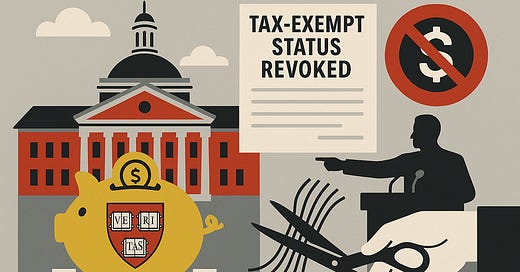Harvard defies the government like only the world's strongest brand can. Here are 5 thoughts from an alum
On cowardice, cash, credibility, conflicts, costs, and core principles
Hi, I’m Jamaal. Welcome to Jamaal’s Letter, where I share personal reflections, insights, predictions, and strong opinions on the future of markets, work, business, tech, and more.
The people who read this newsletter are the people who run the world. If you aren’t yet a subscriber, consider joining them by subscribing below. Please share it with your friends and colleagues if you find it helpful:
The Trump administration has threatened to revoke Harvard's tax-exempt status and is withdrawing federal funding after the university defied government demands.
I received a master's degree from Harvard a decade ago, and as someone who both teaches at universities and invests in education, I've written about the space frequently. I got a degree from Harvard because it’s the strongest institutional, not just academic, brand on the planet.
As an alum, here are six things I'm thinking about as this unprecedented standoff unfolds.
1. Harvard's $53 Billion Shield (And Why It Still Bends)
While Harvard's defiance feels principled, it's driven by practical realities: a nearly $53 billion endowment that dwarfs peers like Columbia by 3x. This financial fortress provides options that other institutions simply don't have.
This begs the question: What good is privilege if you don't use it to insulate yourself from bullying? The most disappointing aspect of this political moment is watching the firms and individuals with the most resources—those with zero direct exposure to government contracts—publicly and embarrassingly capitulate first.
The entities best positioned to resist are the first ones rolling over. And for every public capitulation, there are a dozen more staying intentionally quiet to avoid the spotlight.
But Harvard isn't immune to pressure. In March, the university preemptively dismissed leaders of its Center for Middle Eastern Studies and suspended its partnership with Birzeit University in the West Bank. So while its overall stance has been right, Harvard has already shown it will bend when pushed.
2. The Demise of Harvard Is Greatly Exaggerated
Even before this administration, critics were predicting Harvard's demise. They pointed to a 5% drop in applications during the '23-’24 cycle (which leveled off in '24-’25) and claimed the brand was finally losing its luster.
I'm unconvinced. Short-term leadership missteps are being conflated with long-term brand damage. Application numbers are too volatile and politically cyclical to draw conclusions. Harvard remains one of the most potent global brands ever created—more resilient than most companies, universities, or even countries.
The real threat isn't this administration, it's 1) the broader decline in trust and value that all institutions face, and 2) internal disagreement among its most important constituencies.

3. The War Inside Harvard Is Deadlier Than the One Outside
While the Trump administration makes a clear antagonist, Harvard's internal divisions pose a more existential threat. The university is a house divided, with core constituencies fundamentally disagreeing on issues like speech intolerance, the claims of antisemitism on campus, and how to address the situation.
These internal battles create impossible leadership challenges. Running Harvard, or any other high-profile academic institution, today might be among the hardest organizational leadership jobs on the planet. You're trapped between students demanding action, faculty split along ideological lines, donors threatening to withhold funds, government officials applying pressure, and alumni voicing concerns from every direction. The loudest voices don't always control the resources, and those with real power often operate behind the scenes, creating a maze of competing priorities with no winning moves.
4. Harvard's Bloated Empire Could Use a Financial Wake-Up Call
I love research universities. I've spent a lot of my career on campuses like Harvard's. They're unique intersections of people and ideas. But let's be honest: they're also often shiny, luxurious, and expensive in ways that don't always serve the academic mission.
I suspect a deep dive into Harvard's finances would reveal significant bloat and inefficiencies. Take, for example, its endowment. A recent Bloomberg article showed that Harvard Management Company has paid top investment managers $800 million over two decades while the endowment underperformed peers and benchmarks. If financial pressure forces tough decisions, it might benefit Harvard in the long term, even if it means painful program cuts.
5. This Is About Principle, Not Politics (And That's Why It Matters)
I know people who would cheer government interference if it came from an administration they liked, pushing policies they supported. That's exactly backwards.
Harvard's defiance would be appropriate regardless of which party held power or which policies were being pushed. Government overreach into academic freedom is wrong, period. The principle matters more than any specific political battle.
This isn't about liking or disliking Harvard, Trump, or any particular policy. It's about whether we believe universities should maintain independence from government coercion. That principle shouldn't bend based on political winds.
Read more:




![r/dataisbeautiful - [OC] Biggest University Endowments In The United States r/dataisbeautiful - [OC] Biggest University Endowments In The United States](https://substackcdn.com/image/fetch/$s_!JH3p!,w_1456,c_limit,f_auto,q_auto:good,fl_progressive:steep/https%3A%2F%2Fsubstack-post-media.s3.amazonaws.com%2Fpublic%2Fimages%2Fd52e6fe9-fe40-4e59-ad81-b65def26b9bc_4500x4500.png)

